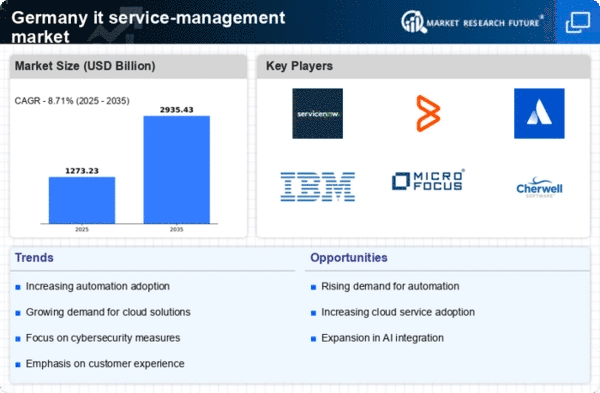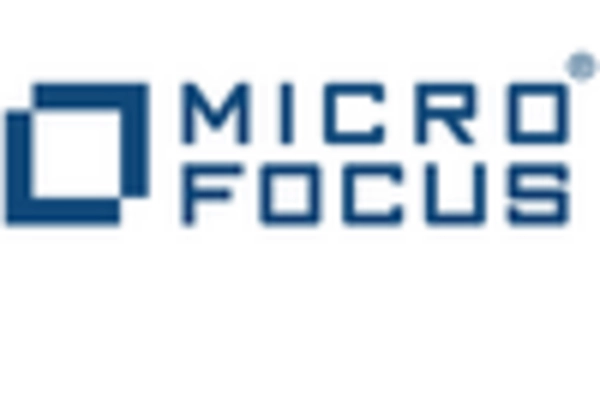Focus on Cost Optimization
Cost optimization remains a critical focus for organizations in Germany, influencing the it service-management market. As businesses strive to enhance profitability, there is a growing emphasis on reducing operational costs while maintaining service quality. It is estimated that organizations can achieve up to 30% cost savings by implementing effective IT service management practices. This realization drives companies to invest in IT service management solutions that streamline processes, automate tasks, and improve resource allocation. The potential for cost reduction is a compelling driver for organizations seeking to enhance their competitive edge. As a result, the it service-management market is likely to experience increased demand for solutions that facilitate cost-effective service delivery and operational efficiency.
Increased Cybersecurity Threats
The rise in cybersecurity threats is a pressing concern for organizations in Germany, thereby impacting the it service-management market. With cyberattacks becoming more sophisticated, businesses are compelled to enhance their IT security measures. Recent statistics indicate that over 60% of German companies have experienced a cyber incident in the past year, prompting a reevaluation of their IT service management strategies. This situation creates a heightened demand for IT service management solutions that incorporate advanced security features, such as incident response and threat detection. As organizations prioritize cybersecurity, investments in IT service management tools that can effectively address these threats are expected to increase. This driver reflects the necessity for IT service management to evolve in response to the changing cybersecurity landscape.
Digital Transformation Initiatives
The ongoing digital transformation initiatives across various sectors in Germany are driving the it service-management market. Organizations are increasingly adopting digital tools to enhance operational efficiency and improve service delivery. According to recent data, approximately 70% of German companies have initiated digital transformation projects, which often necessitate robust IT service management solutions. This trend indicates a growing demand for integrated service management platforms that can streamline processes and facilitate better communication among teams. As businesses strive to remain competitive, the need for effective IT service management becomes paramount, leading to increased investments in this market. The it service-management market is thus positioned to benefit from these initiatives, as companies seek to optimize their IT infrastructure and improve service quality.
Regulatory Compliance Requirements
In Germany, stringent regulatory compliance requirements are significantly influencing the it service-management market. Organizations must adhere to various regulations, such as the General Data Protection Regulation (GDPR) and the IT Security Act, which mandate robust data management and security practices. This compliance landscape compels businesses to invest in IT service management solutions that can ensure adherence to these regulations. It is estimated that compliance-related expenditures account for about 15% of IT budgets in Germany, highlighting the financial implications of regulatory requirements. Consequently, the demand for IT service management tools that facilitate compliance tracking and reporting is likely to grow, as organizations seek to mitigate risks associated with non-compliance. This driver underscores the critical role of IT service management in maintaining regulatory standards.
Growing Demand for Remote Work Solutions
The shift towards remote work in Germany is reshaping the it service-management market. As organizations adapt to flexible work arrangements, there is a rising need for IT service management solutions that support remote collaboration and service delivery. Data suggests that approximately 40% of the workforce in Germany is now engaged in remote work, necessitating tools that can facilitate seamless communication and support. This trend drives the demand for IT service management platforms that offer remote access, incident management, and user support capabilities. Companies are increasingly recognizing the importance of maintaining service quality and operational efficiency in a remote environment, leading to greater investments in IT service management solutions. This driver highlights the evolving nature of work and its implications for IT service management.
















